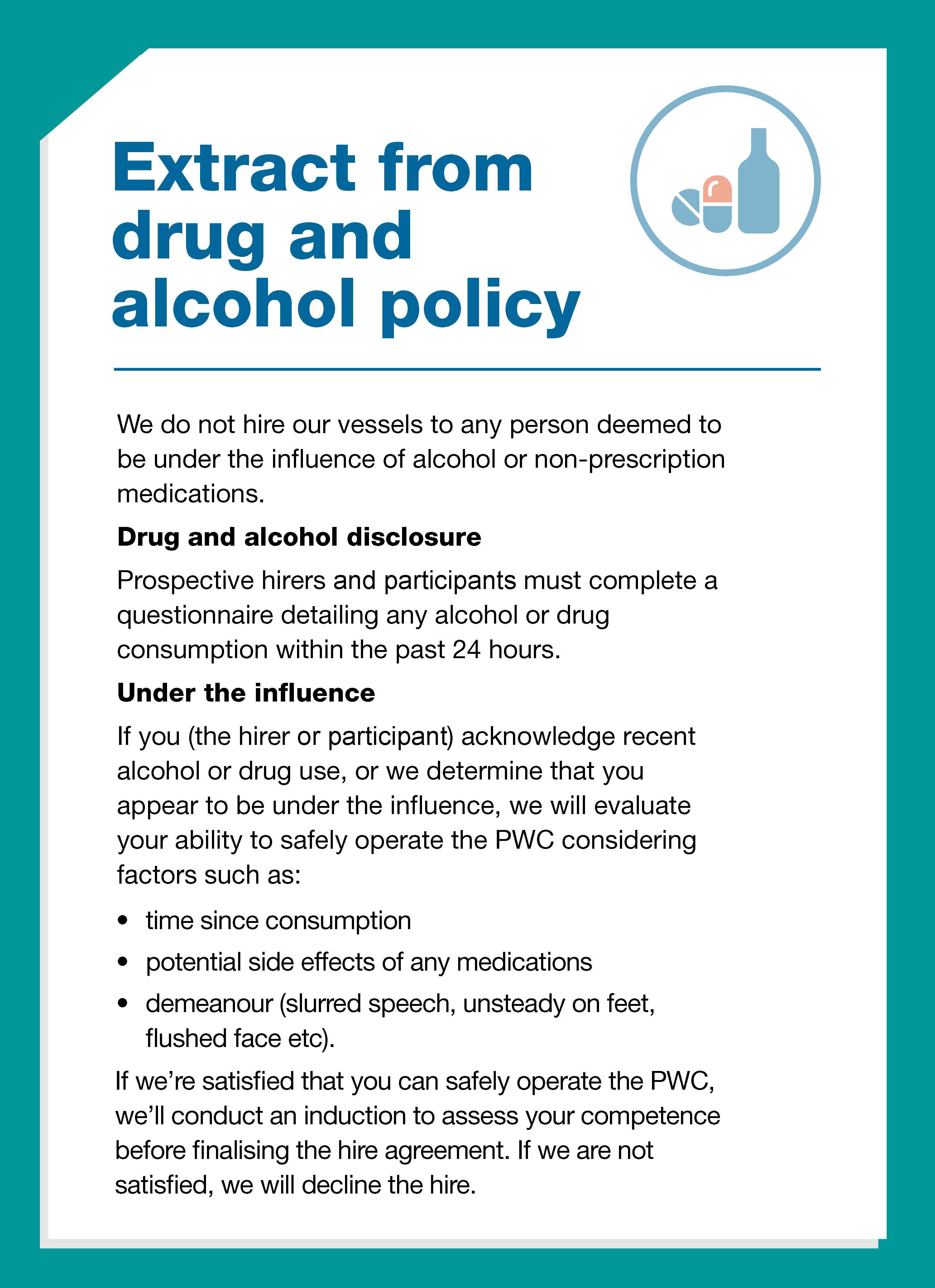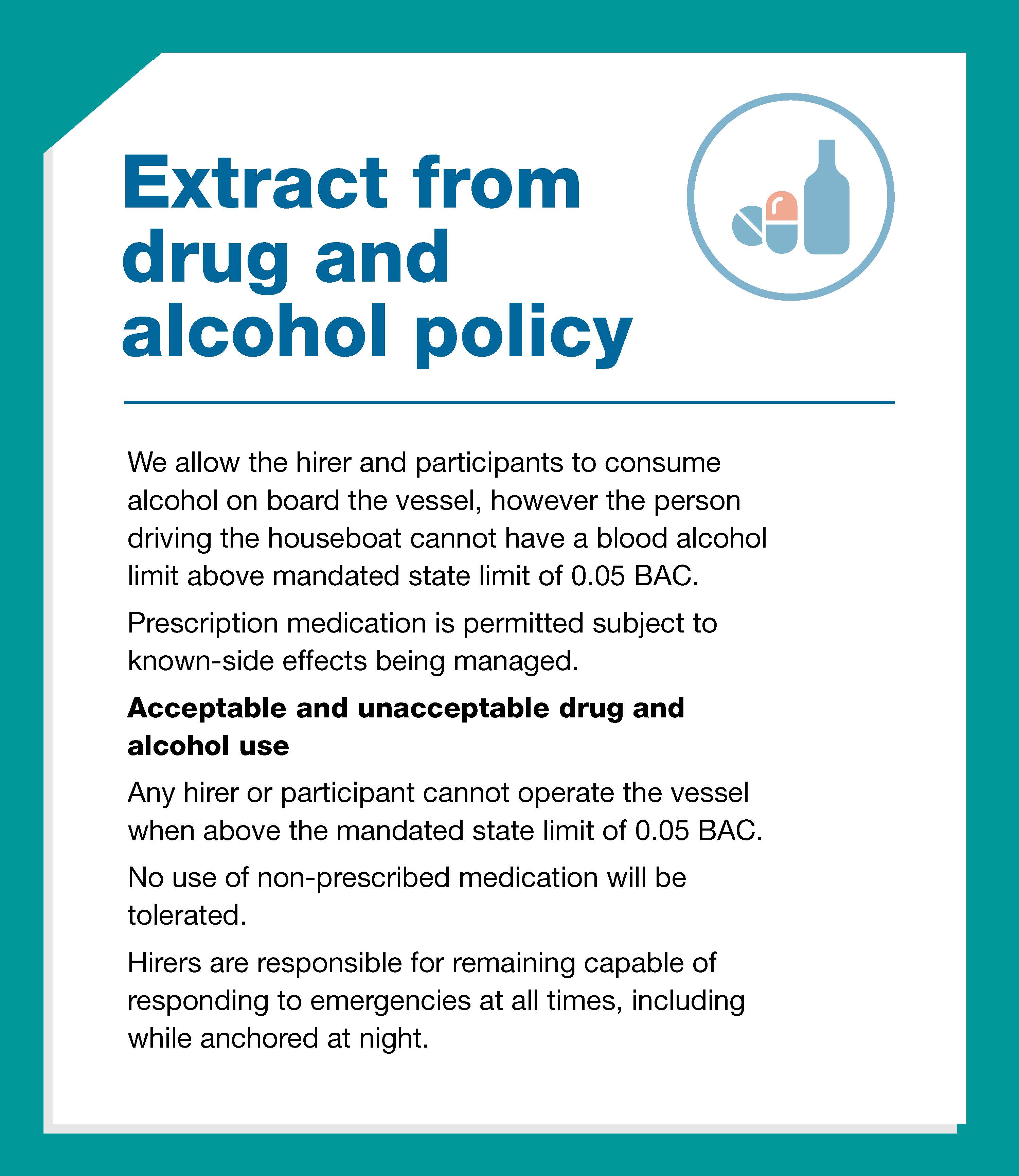New requirement: Include a drug and alcohol policy in your SMS.
Applies to: Class 4 vessels. There’s different guidance for Class 1, 2 and 3 vessels.
Comes into effect: 1 June 2025.
On this page:
Overview
From 1 June 2025, all hire and drive operators must have a policy outlining how they will manage the risks of drugs and alcohol included in their safety management system (SMS).
We introduced this change to address the safety risks associated with drug and alcohol use.
It is crucial that all hirers, participants, and staff:
- are familiar with your drug and alcohol policy
- are fit to take control of the vessel
- are not impaired by drugs or alcohol.
How to develop a drug and alcohol policy
Documentation: Create your drug and alcohol policy document and store it in your SMS.
You may also need to update documents impacted by your drug and alcohol policy, such as:
- induction
- operation procedures
- training
- terms and conditions of hire.
Level of detail: The level of detail in your policy depends on the size and complexity of your operation.
A drug and alcohol policy for an operation eligible for a simplified SMS may be a few sentences long. A policy for a larger operation may be much more detailed.
Follow these steps to develop a policy for your operation.
- Step 1. Educate
Start by learning about drugs and alcohol in the workplace. Refer to:
- guidance on drugs and alcohol from Safe Work Australia
- state/territory legislation on drugs and alcohol, including those covering possession, alcohol limits and use
- guidance on work health and safety on DCVs.
- Step 2. Develop
The owner should develop the policy in consultation with staff.
Consider what works best for your operation to ensure the safety of hirers, participants, staff, and the vessel.
Note: You must make sure your policy aligns with any state/territory legislation where the vessel is operating (see Step 1).
What to consider
As a hire and drive operator, your drug and alcohol policy should cover expectations for:
- staff
- hirers
- participants.
Staff
- Acceptable and unacceptable drug and alcohol use: Consider whether to permit staff to have a limited supply of alcohol at the end of their shift.
- Drug and alcohol disclosure: Consider creating a procedure asking staff members to inform the owner about prescription medications they’re taking. This will help you identify any potential side effects that could impact their ability to operate the vessel safely.
- Drug and alcohol testing: Consider conducting testing as part of pre-departure checks to confirm that staff boarding the vessel are not under the influence of alcohol or drugs.
- Unfit for duty/under the influence: Consider denying boarding to any crew found to be under the influence.
Hirers and participants
- Acceptable and unacceptable drug and alcohol use: Where vessels are hired for multiple days e.g. houseboats, consider permitting hirers and participants to consume alcohol within limits defined in state/territory legislation. Make sure hirers can safely operate the vessel, including during emergencies.
- Drug and alcohol disclosure: Consider establishing a policy that asks the hirer to disclose if they are taking prescription medication. This will help you identify any potential side effects that could impact their ability to operate the vessel safely.
- Drug and alcohol fact sheet: Consider requesting hirers/participants to read and sign your drug and alcohol policy. Make the policy available to hirers/participants on the vessel (easily visible).
- Unfit for duty/under the influence: Consider how to handle a situation where a hirer or participant is impaired. Your policy could include information about hirers'/participants' general safety duties under the national law.
- Step 3. Trial
Trial your policy for 1-2 months to identify and address any problems. Then ask:
- How well is the policy working?
- Is anything missing or does anything need amending?
- Step 4. Monitor, review and revise
Once the initial policy has been developed and trialled and you’re sure it’s fit for purpose, review it:
- annually to reflect any changes in legislation or best practices
- after any marine incident
- as new medications are prescribed to staff
- as new medical conditions arise among staff.
Stay informed about any new developments in drug testing technology or legal requirements that may affect your operations.
By staying proactive and responsive to these issues, you can ensure a safer environment for everyone involved in hiring and operating vessels, minimising risks and enhancing the overall experience for participants.
- Step 5: Train
Conduct regular training sessions and meetings to help reinforce the policy and ensure that all staff understand the importance of sticking to it.
Download or print and share: How to develop a drug and alcohol policy – Class 4 vessels PDF330.96 KB
Class 4D personal watercrafts (PWCs)
The owner of a hire and drive business hires PWCs to tourists in an area approved for these activities by the local council and state marine agency.
- Image description: Drug and alcohol policy
We do not hire our vessels to any person deemed to be under the influence of alcohol or non-prescription medications.
Drug and alcohol disclosure
Prospective hirers must complete a questionnaire detailing any alcohol or drug consumption within the past 24 hours.
Under the influence
If you (the hirer) acknowledge recent alcohol or drug use, or we determine that you appear to be under the influence, we will evaluate your ability to safely operate the PWC considering factors such as:
- time since consumption
- potential side effects of any medications
- demeanour (slurred speech, unsteady on feet, flushed face etc).
If we’re satisfied that you can safely operate the PWC, we’ll conduct an induction to assess your competence before finalising the hire agreement. If we are not satisfied, we will decline the hire.

11.2m Class 4E houseboat
The owner of a hire and drive business offers houseboats for hire on inland waterways, typically for periods up to one week.
Recognising that hirers may consume alcohol onboard, the owner assesses associated risks and implements policies to mitigate them.
The terms are outlined in the policy and in the hire contract. Prospective hirers must read, understand, and sign the hire agreement, acknowledging and agreeing to these conditions.
- Image description: Drug and alcohol policy
We allow the hirer and participants to consume alcohol on board the vessel, however the person driving the houseboat cannot have a blood alcohol limit above mandated state limit of 0.05 BAC. Prescription medication is permitted subject to known-side effects being managed.
Acceptable and unacceptable drug and alcohol use
Any hirer or participant cannot operate the vessel when above the mandated state limit of 0.05 BAC. No use of non-prescribed medication will be tolerated.
Hirers are responsible for remaining capable of responding to emergencies at all times, including while anchored at night.

Q & A
- I already have a drug and alcohol policy. Do I need to do anything?
- Will AMSA require a minimum number of drug and alcohol tests to be conducted and recorded each year?
- How can I find out about the possible side effects of medication that my staff are taking?
- I believe a dry boat should be a basic safety precaution for all vessels. Why didn’t AMSA prohibit alcohol for all crew on board commercial vessels?
- If a crew member is on board and takes a drug which affects their judgement, what measures can the master take to confine the crew member?
- If the master asks me what prescription drugs I’m taking, do I have the right to privacy?
- Is the addition of a drug and alcohol policy a new requirement for a vessel’s SMS?
Webinar
Watch a recording of the safety management system requirements webinar, presented on 19 March 2025. We discussed drug and alcohol policy requirements and answered questions from industry.
Contact
Got a question about this requirement? Please contact us.
See what other updates you need to make to your SMS before 1 June 2025.